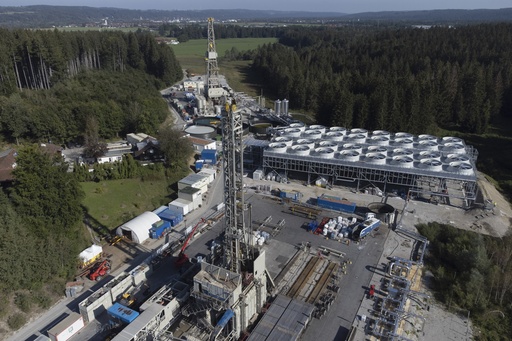
Residents of Geretsried, a small town in Germany, have long aspired to utilize geothermal energy for their heating and electricity needs, moving away from fossil fuels. Their aspirations took a hit around 15 years ago when a drilling company was unable to find enough hot water near the surface, making traditional geothermal energy extraction unfeasible. This setback effectively limited them to relying on natural gas.
First Mayor Michael Müller, a resident of Geretsried, expressed disappointment over the past failure, stating, “We gave up. We had big hopes.” However, the landscape is changing as a new wave of geothermal companies emerges, employing advanced techniques originally developed in the oil and gas sector. These firms aim to dig deeper, accessing dry, hot rock rather than relying on surface water. One such company, Eavor, is launching its first commercial geothermal power plant in Geretsried, potentially transforming the town of around 26,000 residents into a testing site for geothermal technology.
The International Energy Agency (IEA) believes there is substantial potential for geothermal energy, citing technological advancements that allow drilling beyond 3 kilometers (almost 2 miles). The IEA recently reported that nearly all countries could now harness geothermal energy due to these scientific breakthroughs. IEA Executive Director Fatih Birol noted the paradigm shift, stating, “It has been a niche energy and concentrated in a few countries,” but mentioned that soon geothermal energy could play a bigger role in the energy landscape worldwide.
The initial difficulties in Geretsried intrigued Eavor, as CEO John Redfern mentioned that the previous failure could turn into a significant success story. According to Redfern, demonstrating their technology in Geretsried, where typical geology posed challenges, would have a stronger impact than if they showcased it in geothermal-rich regions like Iceland. The enthusiasm from the local community concerning geothermal energy exploration also played a crucial role in Eavor’s choice.
Germany’s commitment to reducing fossil fuel reliance has become more pressing, particularly since heating systems contribute significantly to carbon emissions. Additionally, geopolitical factors have emerged, making it crucial for Germany to reduce dependence on Russian natural gas in light of the ongoing conflict starting in 2022.
Eavor has a pilot facility in Alberta, Canada, and is familiar with Geretsried; one of their executives previously managed the drilling that took place in the town. Eavor plans for the geothermal plant in Geretsried to commence operational electricity generation this year—a significant milestone for the area. This project aims first to produce electricity and will eventually supply heating as the town rolls out a district heating system.
District heating involves generating heat at a central facility and distributing it to residences and businesses. Traditionally, these systems depend on fossil fuel burning, especially in countries like China and Russia, where such networks are most prevalent. In Europe alone, there are around 17,000 district heating systems that provide services to approximately 67 million people. In the United States, district heating systems are commonly found on college campuses, hospitals, military bases, and some urban downtowns, with many universities switching to geothermal to combat climate change. Interestingly, while the previous U.S. administration leaned towards fossil fuel policies, it has shown some support for geothermal energy initiatives.
Eavor has also secured a contract to supply heat to Hanover, a city in northwestern Germany with a population exceeding 500,000, as it phases out coal. The company is extending its reach by licensing its technology to various utilities and companies eager to reduce emissions and enhance energy security. Notably, Japan’s Chubu Electric Power Company has invested significantly in Eavor, highlighting Japan’s potential for geothermal development despite having few operational plants.
Eavor employs a unique geothermal method by drilling two vertical wells approximately 4 kilometers deep and then branching out with about a dozen lateral wells to maximize interaction with the hot rocks. This innovative approach creates a closed-loop system that they call the “Eavor loop.” In the Geretsried project, four loops will be established, each with two vertical wells and twelve lateral wells.
Unlike some geothermal techniques, Eavor does not utilize hydraulic fracturing to increase rock permeability. Instead, they will pump water down into the system, which will then circulate through the hot rock, heating on contact before rising naturally to the surface.
This heated water will be instrumental for heating purposes and can also be directed to a power plant to generate steam, which then spins a turbine to produce electricity while maintaining minimal emissions. Mayor Müller emphasized the need for immediate action on energy strategies, expressing concern over long-term reliance on fossil fuels. He stated, “We want to remain future proof,” adding the importance of starting today to address climate concerns and secure energy for the future.

